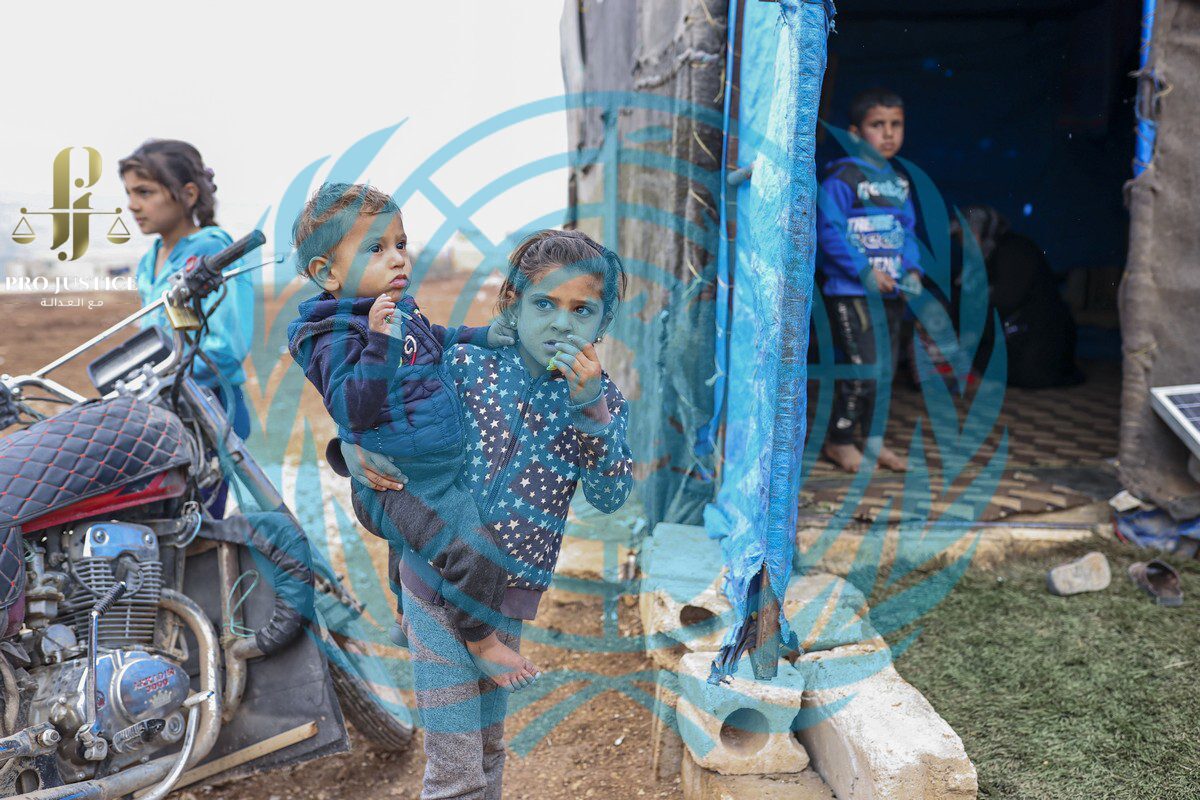إذا تدهورت العلاقات الدولية في كانون الأول / ديسمبر وأغلق المعبر الحدودي الأخير إلى سوريا، فإن الشعب السوري هو الذي سيدفع الثمن الأعلى.
19 / تموز / يوليو / 2022

*مع العدالة | ضحايا -ترجمات
المصدر: Middle East Monitor
مرة أخرى، في الأسبوع الماضي، منح شعب شمال غرب سوريا مهلة في اللحظة الأخيرة. وخشي مجتمع الإغاثة من وقوع كارثة أخيراً، بعد سنوات من الأخطاء الوشيكة، من أن مجلس الأمن الدولي سيفشل في تجديد آخر معبر حدودي للمساعدات من تركيا إلى إدلب. لحسن الحظ، بعد أيام من انتهاء صلاحيته، تم تجديد القرار لمدة ستة أشهر، مع تقليص المساعدات الإنسانية على الرغم من الحاجة المتزايدة.
ومجدداً، ستكون هناك لعبة شطرنج سياسية تلعب مع حياة ملايين العائلات السورية، في ديسمبر / كانون الأول عندما يؤدي شتاء قاس آخر إلى تفاقم الاحتياجات الإنسانية. من المقرر أن يكون هذا الشتاء الأسوأ حتى الآن، مع ارتفاع تكاليف الضروريات مثل الغذاء والوقود، اللازمة لتدفئة خيام النازحين السوريين، نتيجة الانكماش الاقتصادي الناجم عن الوباء والتضخم والأزمة في أوكرانيا.

- وعلى نحو متشائم، بدأ الأمر يشعر بأنه أقل تجديداً لعبور المساعدات على الحدود، وأشبه بوقف تنفيذ حكم الإعدام مؤقتاً.
في حالة عدم تجديد عملية الأمم المتحدة عبر الحدود، لن تتمكن المنظمات غير الحكومية من استبدال هذه المساعدة مباشرة على النطاق الذي تقدمه الأمم المتحدة. فعلى سبيل المثال، يوفر برنامج الأغذية العالمي حوالي 80 في المائة من الاستجابة الغذائية في شمال غرب سوريا، حيث يزود 1.4 مليون شخص بالسلال الغذائية كل شهر. ولن تتمكن المنظمات غير الحكومية من زيادة المساعدة لتلبية هذه الاحتياجات، مما يترك ملايين الأشخاص دون تلبية احتياجاتهم. ويخول القرار أيضاً قدرة الأمم المتحدة على تقديم الدعم المالي للشركاء والبرامج في المناطق غير الخاضعة لسيطرة الحكومة السورية. إذا لم يتم إعادة تفويض القرار، فلن تتمكن الأمم المتحدة من تمويل الشركاء غير المسجلين لدى نظام الأسد، وسيتعين على الأمم المتحدة وقف الصندوق الإنساني عبر الحدود السورية. سيكون لهذا تأثير هائل على العمليات في الشمال الغربي، وخاصة على المنظمات غير الحكومية المحلية مثل الإغاثة السورية.
يجب أن تكون المساعدات الإنسانية محايدة وغير متحيزة ومتاحة لأي شخص يحتاج إليها. ومع ذلك، على مدار 11 عاماً ونصف من النزاع، كانت سوريا أخطر مكان في العالم لتقديم المساعدة الإنسانية، حيث سجلت قاعدة بيانات أمن عمال الإغاثة 323 هجوماً على عمال الإغاثة منذ بدء النزاع في عام 2011.
لقد استجاب المجتمع الدولي عن حق للأزمة الإنسانية في أوكرانيا، ولكن هذا لا يمكن أن يأتي على حساب الوفاء بالالتزامات تجاه الشعب السوري. كان الاختلاف في كيفية تعامل العالم مع المعاناة الإنسانية في سوريا، مقارنة بأوكرانيا، صارخاً. والدعم غير المحدود وغير المشروط الذي أبداه المجتمع الدولي للتخفيف من معاناة شعب أوكرانيا جدير بالثناء والتشجيع، وهو كيف ينبغي لنا أن نستجيب لجميع الأزمات الإنسانية.
إنها في الواقع التداعيات الدبلوماسية بين القوى العظمى على أوكرانيا والتي، جزئياً، تجعل مستقبل المساعدات عبر الحدود محفوفاً بالمخاطر بالنسبة للناس في شمال غرب سوريا. وقد تؤدي المناورات الجيوسياسية المكثفة إلى إغلاق آخر حدود للمساعدات، مما يؤثر بشدة على القدرة على الوصول إلى الغذاء والدواء والمياه لما يقرب من 2.4 مليون شخص يعتمدون فقط على آلية عبور الحدود.
هذه ليست سوى واحدة من العديد من التناقضات بين كيف أن المجتمع الدولي، عن حق، لم يدخر أي نفقات للأشخاص الذين يعانون في أوكرانيا، ومع ذلك، اتخذ القرار السياسي بإعطاء الأولوية للمعاناة في سوريا وأفغانستان واليمن وغيرها من البلدان التي تواجه أزمات. على سبيل المثال، في آذار 2022، نشرت حكومة المملكة المتحدة استراتيجيتها الإنمائية الدولية، التي التزمت بإنفاق 3 مليارات دولار (3.6 مليار دولار) على العمل الإنساني على مدى السنوات الثلاث المقبلة. ويبلغ هذا المبلغ حوالي 1 مليار دولار (1.2 مليار دولار) سنوياً، وهو ما يرقى إلى انخفاض كبير في الموارد في وقت تتزايد فيه الاحتياجات الإنسانية، وفي حين أن الالتزامات بالأزمة في أوكرانيا ملموسة، فليس هناك ما يضمن إنفاق المساعدات الإنسانية في الدول الهشة والمتأثرة بالصراع، مثل اليمن وسوريا، كما كان الحال في السابق. ومع ذلك، فإن الصراع في أوكرانيا نفسها يرفع تكلفة المعيشة في سوريا، كما هو الحال على مستوى العالم، عندما يعيش أكثر من 90 في المائة من السوريين تحت خط الفقر، فإنه يشعر هنا أكثر صعوبة من أي مكان آخر.

وإذا تدهورت العلاقات الدولية في كانون الأول / ديسمبر وأغلق المعبر الحدودي الأخير إلى سوريا، فإن الشعب السوري هو الذي سيدفع الثمن الأعلى. إن هذا الصراع يدفع بالفعل العديد من الناس إلى ما هو أبعد بكثير من عتبات اليأس، وغالباً ما يكون أكثر الناس ضعفاً، وخاصة النساء والفتيات، هم ضحايا هذا الصراع. وسيكون لإزالة قناة المساعدة هذه أثر إنساني مدمر على أشد الفئات ضعفاً.
ومن المهم أكثر من أي وقت مضى أن يقوم المجتمع الدولي بحماية الالتزامات تجاه الناس في الأزمات التي طال أمدها والاحتفاظ بها. ويجب عليها أن تعمل الآن لتفعيل استخدام أدوات الحكومة الأوسع نطاقاً واستعادة التمويل فوراً لمعالجة الأسباب الجذرية للأزمات الإنسانية. البديل، نخشى، لا يمكن تصوره.

 Eng
Eng